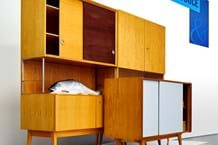Unlike in Europe, where draft legislation restricting the use of mercury views antique barometers as a special case, it appears antiques are not exempt from the US laws.
The state legislation, part of larger bills intended to reduce environmental contamination from mercury, makes it illegal to sell objects containing mercury – a toxin that can accumulate in water and air, causing health risks for humans, animals and fish.
States with active or pending mercury management legislation likely to impact the antiques trade include California, Connecticut, Illinois, Maine, Maryland, Massachusetts, Montana, New York, New Jersey, Rhode Island, Vermont and Washington.
The laws vary in content and ambiguity. New Hampshire now has a mercury reduction law, but some of its language appears to afford sellers some leeway; Minnesota requires objects that contain mercury to be clearly labeled before sale; while a law currently being considered in Ohio that would prohibit selling mercury added products – including those “for household adornment” – unless the manufacturer (also defined as “importer or exporter”) provides written notification to the state and receives an exemption.
However, only Indiana provides a specific exemption within its law for antique barometers, defined here as those made prior to 1980.
Some states have had mercury management laws for up to three years but the bans were not well publicised. Recent press coverage of the issue has prompted fair organisers in New York to ban mercury barometers and/or thermometers and medical equipment, while Sotheby’s and Christie’s have publicly declared their policy not to sell mercury barometers in the United States.
“We haven’t been selling them for at least a year now,” said a spokesperson for Christie’s, although they cited safety and liability concerns for the decision rather than legislation. Skinner, the Boston auction house well known for its Science and Technology auctions, will need to follow suit once the Massachusetts ban signed into law on July 29 takes effect in May 2008.
Most affected by the bans, however, are the individual dealers across the country who specialise in antique barometers. Their outlets for buying and selling appear to be dwindling.
“It’s a pathetic response to pollution,” said John Forster, whose business, Barometer Fair, is the largest retailer of antique working barometers in the United States. He is based in Florida, where barometer sales are not yet restricted. “The overwhelming majority of mercury problems are caused by the burning of fossil fuels… this is like banning backyard barbecues to get rid of smog.”
He and other dealers hope to apply pressure that will see amendments exempting antique barometers or a scheme that would allow licensed specialists to sell and repair mercury-added objects.
As reported in ATG No. 1735, April 15, fears that the European Commission’s proposals to restrict the use of mercury could threaten the trade in antique barometers appear to have receded with an amendment to the proposals reading: “exceptions should apply to the rare cases of maintenance of traditional barometers, museum collections and industrial heritage.”
BY SARAH CAMPBELL
North American barometer trade under pressure
The North American trade in antique barometers is under threat from mercury management legislation now operating in a dozen states.




